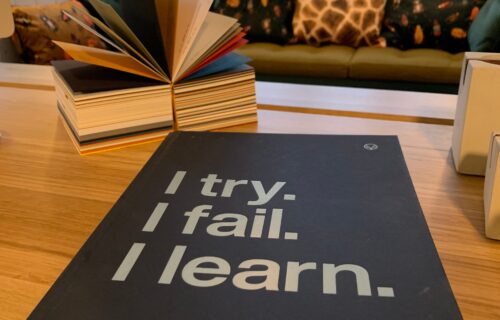
The power of B – a plan for future possibilities.
As we creak back to normality (and long may it continue!), our human nature means that we will probably process some “normalness” and then be lulled into assuming that things will snap back to normal and we all carry on. But, I’m thinking that, a bit like my post-pregnancy bod some 18 years ago, things may not flick back into place quickly and easily and having a plan for future possibilities is a really sensible habit to develop and have in your back pocket.
Here’s an example of why I’m thinking that…
Why things may be different in the future.
Our patterns of consumption changed dramatically over lockdown, our patterns of working have changed, our healthcare system has been under enormous strain, there are still countries across the world who are suffering horrendous levels of cases and many people in this country are still processing the effects of the last year on their families, their business and their community. That’s a whole lot of changes going on, that will continue to have reverberations for months to come.
As business owners we need to think about this now, we need to get prepared and that’s where the power of B comes in…
You see, spending a bit of time looking down the tube at the future and thinking about potential effects can really pay dividends if any of them do become a reality. Plan Bs are extremely useful to have in your back pocket.
Let’s take one example that’s probably close to home for many of us – food.
Farmers have to start growing their crops many months before we start consuming them. Over lockdown, we’ve been home more, so we’ve eaten more salads (for example), so we’ll probably have eaten into cold store stocks that were meant to take us through Spring into when the next harvest season starts.
The weather over the past few weeks has been too dry for most farmers liking, so crops are slower growing and on top of that it’s been too cold. Add to that the fact that when the season does kick in and it’s harvest time, there are currently far less workers in this country at the moment due to Brexit and Covid quarantines – so farmers may have to pay more to get harvest labour.
Why we need to plan for future possibilities.
Our farmers are amazing and they will move heaven and earth to overcome this problem, but it’s hard to see how that can happen without it costing more, which will mean that prices will likely need to go up somewhere.
If you have a food business, that’s worth thinking about now if you’re just starting to set your menus and prices for reopening properly. Do you need to think about the dishes that you put on the menu – think about things like what their substitute ingredients might be, or a more cost effective version of the menu, or a set of back-up costed dishes that you can roll in if you need to?
This is just an example to illustrate my thinking, but in my actual business life I’m sitting and running through similar thoughts about all the supply chains in the companies I’m involved in – what countries do our raw materials originate in, what’s been happening there? If we’ve got long lead times on delivery, do we need to limit the amount of raw material price increase we’ll absorb before we need to pass it on to customers? Do we need to ensure we know where we can get alternative supplies from in case we need to?
You don’t need to spend ages doing this, just have a think about if it might affect you and if it does, what are your critical supplies and what could you do to mitigate potential effects.
As a business owner, I find it’s much easier to have that Plan B sitting there already thought through and end up not needing it, than to be in the middle of (for example) a really busy hospitality season and suddenly be faced with needing to spin things to manage cost or supply changes.
Why Plan B builds your confidence.
Above, we’ve discussed how looking into the future and having some tentative plans for what you might do if things change unexpectedly will really help you cope with those changes, why is that?
Our brain is fundamentally lazy, it likes certainty and its favourite thing to do is repetitive tasks, because it doesn’t really have to process, it just follows a path that it already knows – which normally is great. It’s how you get from A to B in a car without having to actively think about where 3rd gear is all the time.
However, that does mean that when something unexpected is thrown in, your brain defaults to an instinctive response and that response generally is fight or flight and anything you do then usually solves the immediate problem, but may not be the best solution in the long run. Plus, it also takes a lot of energy to cope when you’re working out what’s going on, how it affects you, what you need to do – all at the same time.
Whereas, when you’ve had a think about what might potentially happen and made an outline plan for future possibilities, you have options and the response is more of a pivot than a panic. Just the fact that your brain has something to reach for and consider in a crisis results in a much more measured and manageable response.
How Plan B can help you in your personal life too.
I hope the above illustrates why I’m such a fan of having a Plan B in the wings waiting to assist if required – but it doesn’t just apply to business, I use it in my personal life too.
Once we’re allowed to have friends over again, if we’re planning a BBQ or something, I’ll have a quick think about what will we do if the weather forecast changes and cooking on the BBQ is going to be a washout.
When I gave birth to our sons, neither of them played ball and followed our birth plan, but we had talked about what to do if that didn’t happen and so when we did have to change our plans, the thinking about what to do had been done, we just had to concentrate on the doing. It also helped me in the months that followed, as although obviously there was regret that things weren’t exactly as I would have wished for in a perfect world, I’d known that it was a possibility and that made me much more settled and confident about what had happened.
That’s just a couple of illustrations of real life examples for me and there are many other times, both business and personal when Plan B has got me out of a fix.
So, to summarise, if you’re in a situation where something changing unexpectedly in the future could really affect your ability to deliver what you need to do, take an hour or so to consider what the biggest risks are and what you would do if they happened and jot them down in the back of a notebook for safekeeping. If necessary, find an alternative supplier or have a gazebo ready for that BBQ, so you don’t have to do it in a panic. You don’t need to cover every eventuality or go into lots of detail unless the consequences are so huge that not having a detailed back-up plan would be foolhardy.
Then you can forget about it, unless you actually need it – at which point you will be thanking your lucky stars that you spent a bit of time preparing for this possibility!
What do you think? Please do let me know below in the comments if you find this thought share useful, I’d love to know.
Thank you.




Add A Comment
You must be logged in to post a comment.